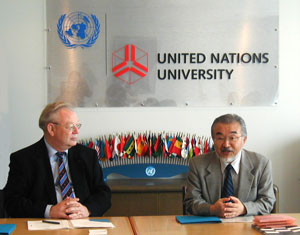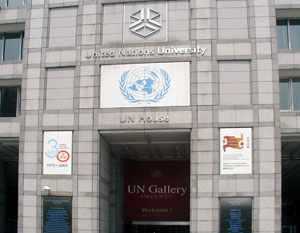Kazuo OIKE

Good morning Professor Ginkel, honorable leaders of the United Nations University, ladies and gentlemen. As president of Kyoto University, I would like to express my deepest gratitude for your cooperation today regarding our agreement to promote exchanges between Kyoto University and the United Nations University.
We have many important opportunities to promote faculty-based cooperation between our universities covering various fields of knowledge. And one of the important fields for our cooperation is, I think, the theme of sustainable society. The United Nations advocates the realization of sustainable society, and sustainable human development is a core theme in the United Nations University. It is also an important academic theme in Kyoto University.
For the realization of sustainable society, it is necessary to promote every branch of learning, for example, sustainable development for both people's lives and economic activities, sustainable forestry management, sustainable management of natural resources, sustainable management of the marine environment, and so on. All these fields are important areas for our universities and they must be comprehensively discussed among researchers in all concerned fields. So I believe that our new exchange agreement will lead to great progress in these areas.
Kyoto University was founded in 1897. It is the second oldest national university in Japan, and is regarded as a prestigious large-scale research university, housing 16 graduate schools, 10 faculties, 13 research institutes, and 19 other research centers. Throughout its history spanning more than 100 years, the university has gained an excellent reputation for its scientific achievements and academic activities in various disciplines. A dedication to fieldwork is one of the unique features of Kyoto University. For example, the Primate Research Institute is a key center for field sciences within the university. We have important key stations in several countries in the Western Africa region. And we also have a cooperation programme related to the HIV/AIDS problem with the Republique de Cote d'Ivoire.

Kyoto is regarded as the spiritual homeland of the Japanese people and recently as a cultural homeland of the people of the world. It is important for this university to protect and develop such world heritages and cultures in cooperation with citizens in the Kyoto region. From the viewpoint of geoscience, Kyoto basin was constructed by the vertical relative movements of many active faults. It is a typical tectonic basin having four distinct seasons and serious natural disasters such as earthquakes, floods and so on. Thus our university has numerous fields related to natural phenomena and natural disasters. Promotion of such research fields is also important for our cooperation.
The agreement that is going to be signed this morning, I believe, will promote the building of an energetic, high-powered and high quality relationship between our universities, and I believe it will create a strong partnership between us to play an important role in maintaining strong international leadership. This new agreement paves a new way for our universities to contribute to international society. That is my greatest joy today.
On behalf of Kyoto University, I would like to express my deepest appreciation to you all for your kind cooperation until now and my heartfelt desire to promote cooperation into the future.
Thank you very much again.

